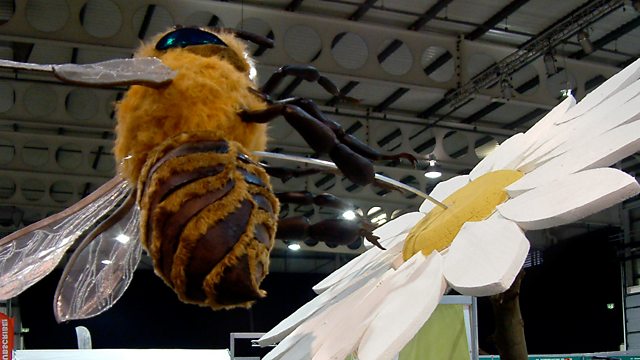Ickenham
Eric Robson chairs a programme from Ickenham, Middlesex, with Chris Beardshaw, Pippa Greenwood and Matthew Wilson taking the audience's questions.
This week Gardeners' Question Time is in Ickenham, Middlesex with Eric Robson in the chair and Chris Beardshaw, Pippa Greenwood and Matthew Wilson taking questions from the audience.
While the international debate continues about the alarming decline in numbers of bees and what we can do to help them, Matthew Wilson looks at why bee memory is important and what gardeners can do to encourage bees in their gardens.
For more details on pollinator-friendly plants mentioned in the programme, please visit: http://www.lbka.org.uk/pollinator_friendly_plants.html
Produced by Victoria Shepherd.
A Somethin' Else production for Βι¶ΉΤΌΕΔ Radio 4.
Questions answered in the programme:
Q: What can the team suggest for summer-flowering plants to cover the graves in the churchyard of a medieval church?
A: The panel recommend a more natural/rougher look by planting more bulbs such as Camassia that has starry pale blue flowers, Ornithogalum will go through into late spring/early summer, Alliums sphaerocephalon has metallic-purple flowers on a long, tall stem that will flower into early July. If you leave the grass long you're likely to get a variety of wildflowers as well as local wildlife. Pulmonarias would be good as they tend to ramble with leaves that have white spots or edges and flowers in bright, cheery colours. Aquilegia columbine would look beautiful and self seed. You could also grow Clematis as ground cover (though not around the graves). Narcissus are fairly rodent-proof, Ranunculus acris 'Flore Pleno' would also look lovely with long arching stems. Lecanthemum vulgare (or oxeye daisy) and Lychnis would be worth including too.
Q: Although I have followed instructions carefully on harvesting potatoes grown in a bag, I have repeatedly only been able to harvest potatoes the size of musket balls. What am I doing wrong?
A: If you possibly can grow in the ground it can be easier, but if you must grow in bags only put a maximum of 3 tubers in a container the size of a domestic dustbin. Since you've been putting 15 in they will all be under immense competition and never grow much bigger than marbles. You need your container to be well-drained so that you can water regularly. You should also be careful about the compost you're using, as poor-quality multipurpose compost can be too granular and dry.
Q: I have a well-established summer-Jasmine climber on a sunny west-facing fence, but the flowers are always very sparse. How can I encourage more flowers?
A: This plant will thrive on a south or west-facing aspect in late evening sun. You must be careful not to over feed it with fertilizer, especially nitrogen-based, because this will encourage top-growth but not flowering. You should take hold of the plant and lay the stems down, don't allow them to go upright. This will change the hormonal balance of the plant and instead of investing energy in going upwards and grow flowers.
Planting for pollinators:
Leave your herbaceous perennials standing at the end of the season because the hollow stems of many provide great over-wintering opportunities for solitary bees. Also we generally have an attitude of being too clean in the garden, so we should make sure to leave some areas of the garden untidy so that insects can thrive. Hedges also provide similar opportunities.
Q: Two years ago I started keeping bees and turned my paddock into a wildflower meadow. I now have dozens of 8-inch high anthills. What have I done to cause this invasion and how can I encourage them to move on without using chemicals?
A: This is likely to have been caused by the wet summer as the ants build upwards to stay dry. Ants look for undisturbed ground so a wildflower meadow is perfect for them. You can do a lot of physical disturbing with a rotavator. You could also try using the biological control nematodes that only irritate the ants and will not damage the local wildlife or plant life.
Q: We've recently leased a gravelled-over garden to provide a sitting-out area for our members. We intend to purchase some attractive small shrubs in pots which need to be low maintenance and inexpensive, what would you suggest?
A: As long as the area doesn't get too hot Acers will do well, such as Acer palmatum. Whatever you grow do grow them in large containers that would be harder to steal! They will also be easier to maintain and the plants will be happier in large containers. You could put in some miniature narcissus for spring colour. The problem is that if you use containers the plants are going to be high-maintenance, so you could install a small 4ml drip-line irrigation system. If it is hot and sunny then you could go for drought-tolerant plants such as Yucca gloriosa ("the Spanish Dagger') and all of the silver-leaf plants such as lavenders.
Last on
More episodes
Previous
Next
Clip
-
![]()
Flowers bloom best with a diet of heavy metal
Duration: 01:32
Broadcasts
- Fri 19 Apr 2013 15:00Βι¶ΉΤΌΕΔ Radio 4
- Sun 21 Apr 2013 14:00Βι¶ΉΤΌΕΔ Radio 4
Six of GQT’s naughtiest gardening innuendos
When Gardeners' Question Time got mucky.
Podcast
-
![]()
Gardeners' Question Time
Horticultural programme featuring a group of gardening experts



